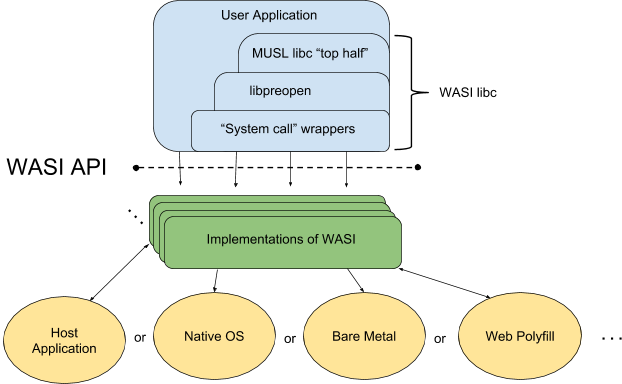Rust on WASM
ubolonton
Created: 2019-09-23 Mon 16:11
About Me
- Rust hobbyist for ~2 years
- Author of Emacs Module in Rust
WebAssembly 101
What Is It?
- Portable binary instruction format
- Like Assembly, but not really
- For the Web, but not only
Why Is It Interesting?
- Portable, vendor-neutral
- Embedding and sandboxing
- Simple compilation target
- Good performance
- JVM/.NET, but better this time
Current State
Technical Detalis
- Structured stack machine
- Core types: i32, i64, f32, f64
- Linear memory, optional GC
- Built-in modules
- Text format: S-expresssions
Linear memory
- Growable, contiguous addressing
- Min (+max) pages pre-declared
- Separate from stack & globals
- Copied, shared is WIP
Modules
- Similar to Mach-O, ELF, PE
- Imports, exports
- Functions, start function
- Local & global variables
- Data section
Text format
.watS-expressions
(module (type (;0;) (func (param i32 i32 i32) (result i32))) (memory (export "mem") 1) (import "env" "_memcpy" (func (type 0))) (func $multiply (param $lhs i32) (param $rhs i32) (result i32) local.get $lhs local.get $rhs i32.mul) (export "multi" (func $multiply)) (func (export "greeting_") (result i32 i32) (i32.const 0) (i32.const 5)) (data (i32.const 0) "hello"))
Rust on WASM
Why Rust?
- Tooling, traction
- Greatly overlapped interest
- No GC: Easy to target WASM
- Highest-level among non-gc langs
Targets
wasm32-unknown-emscriptenwasm32-unknown-unknown
wasm32-unknown-emscripten
- emscripten, emcc
- C-on-wasm interop (stdlib and so on)
- Focuses on whole programs
wasm32-unknown-unknown
- LLVM, clang
- Barebone, minimal
- Focuses on (dynamic) libraries
- Officially preferred
Tooling
stdweb & cargo-web
- Tooling for building web apps
- Higher-level APIs
- Hand-written web bindings
- Targets both
emscriptenand barebone Embedded JS, with interpolation:
js!let button = document().query_selector("#hide-button")?.unwrap(); button.add_event_listener(move |_: ClickEvent| { for anchor in document().query_selector_all( "#main a" ) { js!( @{anchor}.style = "display: none;"; ); } });#[js_export] fn hash(string: String) -> String { let mut hasher = Sha1::new(); hasher.update(string.as_bytes()); hasher.digest().to_string() }
wasm-bindgen & wasm-pack
- Tooling for working with WASM
- Lower-level building blocks
- Auto-generated web bindings
Targets
wasm32-unknown-unknownuse wasm_bindgen::prelude::*; #[wasm_bindgen] extern "C" { fn alert(s: &str); } #[wasm_bindgen] pub fn greet(name: &str) { alert(&format!("Hello, {}!", name)); }
web-sys & js-sys
- Built on
wasm-bindgen - Low-level, "standard library" for Web/JS
Eventually faster than JS DOM APIs
let document = web_sys::window()?.document()?; let body = document.body()?; let val = document.create_element("p")?; val.set_inner_html("Hello from Rust!"); body.append_child(&val)?;
Integration
JavaScript: Parcel
- New JS bundler
Supports Rust (
wasm-bindgen)// synchronous import import { add } from './add.rs' console.log(add(2, 3)) // asynchronous import const { add } = await import('./add.rs') console.log(add(2, 3))
Native Hosts: WASI
- WebAssembly System Interface
- "POSIX for WASM": "syscalls", libc
- Capability-oriented
- Wasmer, Lucet, wasmtime

Other Langs: Interface Types
- Data sharing for dynamic linking
- Pre-defined interface types
- Per-module concrete repr
- Pre-defined adapter instructions
Direct-copy optimization
(module (memory (export "mem") 1) (data (i32.const 0) "hello there") (func (export "greeting_") (result i32 i32) i32.const 0 ;; offset of string in memory i32.const 11 ;; length ) (@interface func (export "greeting") (result string) call-export "greeting_" memory-to-string "mem"))